#what i know about revolutionaries children so far:
Text
One of [Brissot’s] son was placed at the École Polytechnique. By then the imperial scepter weighed on France, and one seemed to have forgotten the martyrs of liberty. All the pupils were solemnly convoked to individually take an oath of fidelity to the emperor. The president called the boys one by one. When the turn of the young Brissot came and the president asked: ”You swear fidelity to the emperor?” the young man answered with a firm voice, ”No!” The president, as you may well imagine, was absolutely taken back by this brusque declaration, and the whole company was stupefied with astonishment. Finally they ventured to ask Brissot what was the reason for his refusal. ”I am too young,” he answered, ”to pass judgment on political matters; what I know is that my father died on the scaffold for the Republic, and I am a republican.” It is difficult to say what the countenance of the presiding dignitary was; but I was assured that the whole school, transported by one of those sudden movements which so easily penetrate young hearts, crowded around the culprit, lavished upon him a thousand assurances of attachment, and followed him as a body when he withdrew. The next day he did not wait for his resignation, he offered it himself. I received all these details from the mother of Madame Brissot, Madame Dupont, who told me about them the day after they happened.
Souvernirs de la Révolution française (1827) by Helen Maria Williams, page 23—24
#frev#french revolution#brissot#helen maria williams#what i know about revolutionaries children so far:#horace desmoulins - cutest#scipion hébert - the one i feel most bad for#whichever of brissot’s three sons this happens to be - most badass#edit: it’s sylvain brissot#the middle child#they do say those do anything to get attention huh?
26 notes
·
View notes
Text
the history of animation in a nutshell
Early 1900s: hey what if comic strips could like move?
Late 1910s early 1920s hey what if we mashed this up with live action people?
late 1920s: hey what if this thing had sound?
Early to mid 1930s: hey what if this had people actually talking and also color?
late 1930s: hey you know that super cool movie that one lady animated with paper cut out silhouettes? What if we did that with painted cells? Would people even pay to see that? Never mind it turns out the answer is yes.
1940s: ah shit most of our animators got drafted and/or hate us now cause we weren’t paying them. IT’S PROPAGANDA TIME BABY. Also haha hitler got hit with a mallet and also the most racist depictions of Japanese people ever.
1950s to 1960s : oh what’s this newfangled thing? Television? What if you could air cartoons on it? Oh fuck no I ain’t paying that much to get the charecters to have different backgrounds and for the charecters to like, move fluidly. Also manga and anime are steadily growing more popular.
1970s: (Ralph Bakshi walks into a comics store and finds a furry comic) X rated animated movie? *cue the screams of mothers and their unsuspecting children now being introduced to the revolutionary idea that cartoons don’t equal kids stuff? WHAT IS THE WORLD COMING TO?
1980s to 1990s: we can have full on animated Broadway musicals? Wait, what do you mean animated movies can count for the Oscar’s? What do you mean now they get their own catagory because the academy still thinks their for babies? Anime and manga are taking off in the west. SWEET JESUS WHAT DRUGS ARE THE JAPANESE ON SHOWING THIS SHIT TO KIDS. But also why is it so fucking good. Maybe some of these aren’t even meant for kids? Wait We can sell toys to kids with cartoons? Wait we can actually put effort into these cartoons on television? The fuck to you mean we can animate in 3D now? What do you mean we can have well animated, well written sitcom shows like the simpsons? What do you mean you can make cartoon charecters say fuck? What drugs are creators at Nickelodeon on? Do I even want to know?
2000s: oh my god, there is this one show that I really like cause it’s really well written and genuinely funny but I can’t talk about it because it’s animated and we all know cartoons are for babies right? Oh look it’s the transformers movie, look how far CGI has evolved so we can make the transformers in a movie.
2010s: holy shit I know these shows are for kids but they’re just well written and have so much meaningful things to say about the world. Wait, it’s cool to like cartoons now? They they have fandoms for this? Fuck yeah I’m in. (Enters one of the most notoriously toxic fandoms of all time) THEY HAVE GAY PEOPLE IN THESE SHOWS NOW? AND COMPLEX EMOTIONAL STORYTELLING? AND ADULT ANIMATED SHOWS CAN BE MORE THAN JUST SITCOMS WITH THE SAME JOKES AND STYLE? WHY IS IT THAT EVERY DISNEY CARTOON SINCE GRAVITY FALLS INCLUDE THINGS THAT GET MORE AND MORE FUCKED UP? WHY DO I FUCKING LOVE IT? WHY THE FUCK DID DISNEY DO THE OWL HOUSE DIRTY LIKE THAT?
2020s: I got this show I wanna pitch but it dosen’t fit into any box that the networks want and also I’m afraid that they’ll just randomly cancel it before I can finish the story I want to tell. Wait, I can just post the pilot on my YouTube channel, see if anybody actually likes this thing I made and just make the show independently? FUCK THE NETWORK! I AM THE NETWORK
#Animation#indie animation#cartoons#classic cartoons#disney#warner bros#Out of the inkwell#Flesher studios#Gravity falls#star vs the forces of evil#amphiba#the owl house#steven universe#Bojack horseman#glitch productions#ramshackle#the amazing digital circus#Murder drones#lackadaisy#hazbin hotel#Ducktales#infinity train#ralph bakshi#fritz the cat#sailor moon#neon genesis evengelion#revolutionary girl utena#helluva boss#the simpsons#south park
579 notes
·
View notes
Text
Luffy's Linage and the Connections to God's Valley
I think we all know that the history of God's Valley is going to be very important to the story and to our protagonist, Luffy. But I think I've realized why it will be the biggest reveal in the story and intertwined intimately with Luffy's creation and destiny. This might sound crazy but I believe wholeheartedly that:
Luffy is the grandchild of Rocks D. Xebec.
Luffy is the child of Crocodile.
Crocodile's mysterious history is interlinked with every important character in the Grandline. Now, let me explain.
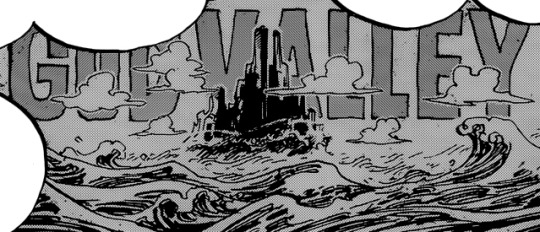
Let's first lay out what we know about the God's Valley incident. We know the Celestial Dragons were on the island, which prompted a young Garp to trust a young Gol D. Roger with an alliance to fight against the Rocks Pirates. Together they won, the incident was covered up, the island disappeared, and Roger found a baby Shanks in a treasure chest as he sailed away.
There is so much about that incident that we don't know, but we do understand just how much it has impacted the world of One Piece. And that goes double for the relationships born from the incident.
Whitebeard and Roger's friendly rivalry, Big Mom's vitriol for Roger, but by far the most interesting thing to come out of the incident is Roger and Garp's mutual respect. Roger respected Garp so much that he trusted the marine with knowledge of his child who was about to be born.

This is the million-dollar question, why would Roger entrust his child's (and at this time, Rouge's) life to this marine who could have become a massively different person in the years since they last met. For all Roger knew Garp was now corrupted by the marines and agreed that Roger's bloodline needed to be eradicated. Well, I believe Roger trusted Garp because he witnessed Garp save a child before against the World Government's wishes; I believe Garp saved Rock's child.
We all understand by now that one of the overarching themes of the story is 'history repeating itself', which is why I think the hunt for Roger's child happened once before with the God's Valley incident. The WG would obviously want to completely erase Rocks from existence (they basically have to with how little we know about him), which would include any children he had fathered to carry on his bloodline. As the fight on God's Valley raged a group of marines, or possibly Cipher Pol, would arrive with the orders to kill anyone with even a passing relation to Rocks. The survivors of this being Rocks top members (Whitebeard, Big Mom, etc.) AND his child; who I am willing to bet real money on was Crocodile.

Crocodile is one of the most interesting characters in the story by far. And while that might be a lot of bias from me, I still think the evidence speaks for itself.
Crocodile is one of the only major villain's that we lack a backstory for, we know more about Warpol's backstory than we do the very first Warlord we ever fought and defeated in story. The man has a strange relationship with animals that is never once explained. Lizard mail runners that we never see utilized by anyone else? Yep, Crocodile's got them. A trained otter and condor being given more trust than the humans in his secret organization? Yes, Crocodile did allow that. Gigantic reptiles that are known to attack Sea Kings? Crocodile kept them as pets and had them so well trained Robin was able to casually pet one! (This doesn't really add to the theory beyond showcasing an odd character trait giving to Crocodile of all people and without any explanation. No one even thought we'd see him again before impel down!)
We also know that Crocodile's inspiration was Roger, from the cover on chapter 408 we learn that Crocodile dreams of being Roger. (very similar to Yamato's dream of being Odin, just more history repeating itself.)

I'm not understating this, Crocodile as a character is so weird. He's got connections to everyone, (Whitebeard, the Revolutionaries, Ivankov, Mihawk, etc.) and yet we've never got any explanation for any of this. We know from how intertwined Crocodile is with the Grandline that he's been a pirate a very long time yet no one in the story seems to know anything about him outside of his Warlord status. In fact, Crocodile seems to be comfortable with the secrets, even being alright with Buggy taking the credit for Cross Guild.
This mans strange relationships with powerful characters like Whitebeard is the reason for the prevalent theory that Crocodile is Whitebeard's only biological child instead of Rocks.... but what if it was both?
No matter how I think about it I've never been able to get over the strangeness of Crocodile and Whitebeard's dynamic in Marineford. Whitebeard definitely doesn't treat Crocodile like someone he cares about, less so like a child that would automatically count in the family that was HIS DREAM. But there is a familiarity in how they address each other, like their history goes back far further than the battle we know they had when Crocodile was a young pirate.
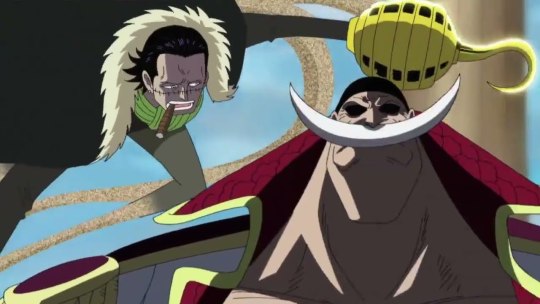
So I propose this:
Crocodile was Rocks child, witnessed Roger take his own father down after standing up to him. This is the reason for Crocodile's dream seemingly being to be Roger. And this would eventually be mirrored in the relationship between Kaido, Yamato, and Oden.
Garp impressed Roger by helping Crocodile to safety instead of following orders and killing him. This would stick with Roger over the years and be why while sitting in prison waiting for execution he decided to put his child's life in Garp's hands.
The safety Crocodile was brought to was Whitebeard. Crocodile was 8 when God's Valley happened, so Whitebeard raised the boy for a few years before Crocodile either ran away or was sent away. We don't know why Crocodile and Whitebeard's relationship turned sour but whatever it was caused Crocodile to see him as an opponent he dreamed of defeating.
This all spurs Crocodile to go to East Blue to witness Roger's end and motivates his desire to defeat Whitebeard as he is now the father figure he must overcome in order to be like Roger. (Kinda like Ace's original desire to defeat Whitebeard huh? Again more history repeating itself.)
Now onto what this means for Luffy, and the story as a whole.
I've already outlined all the evidence for the Trans! Crocodile and Crocodad/Dadodile in many, many, many posts. So I'm not doing that here, you can find my main posts on it here and here. In this post, I want to discuss the ramifications of Crocodile being Rock's child and Luffy's birth parent if this theory proved true.
First of all, this would mean the person that literally gave birth to the dawn and the future sun god Nika/Joyboy incarnate had their life undeniably changed at GOD'S VALLEY. I don't think I need to explain the almost heavy-handed symbolism with that entire naming scheme.
It would also mean that almost everyone who had an impact on Luffy's life was at God's Valley. The person who gave birth to him (Crocodile), the person who inspired his dream (Shanks and Roger), the person to raised him and trained him (Garp), and the person to validated his dream to the world (Whitebeard). All that is missing is Dragon, but for all we know he was there too!
Also I simply love the symbolize that revolves around this entire theory. Luffy would be born from the son of the man who was push into the spot light after God's Valley, praised as a hero. And came from the child of the man who was wiped from history, his family memory thrown to the darkness. Its a clash of opposites, light and dark, a total contradiction, also could be described as a dawn. Not even mentioning the beautiful irony of Joyboy being born from someone taking the name of a predator known for its menacing smile.
If this proved to be true, Crocodile would be centered and primed to possibly be the link between the crew and Gods Valley. Maybe the last Road Poneglyph is there!
But what do others think? I'd love to have a discussion about this if anyone finds counter evidence, or finds evidence that gives more credence to this theory!
Here's an additional link to a great post about this topic I found while looking for evidence.
#one piece#sir crocodile#anime#dadodile#crocomom#one piece fandom#crocodad#one piece crocodile#crocomom theory#crocodile#gator daddy#rocks d. xebec#crocodile is the child of Rocks#monkey d luffy#fan thoughts#fan theory#fandom#one peice#gods valley incident#sun god nka#im a little gay for this theory#rocks child theory#long post
570 notes
·
View notes
Text
The Haitian Revolution
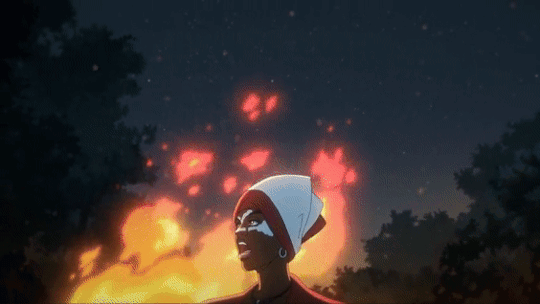
Yeah, okay. I guess to properly do the history thing, I also have to talk about the Haitian Revolution, don't I? Given that it is so important for the backstory of both Annette and Edouard.
Why didn't I do that so far? Because the Haitian Revolution is super hard to talk about because of the sources. A bit issue is that for a good part of it we only have French sources, that are not always the most... neutral. Because a lot of the rebelling slaves had never learned to write. As such, we actually do not know a lot about the side of the rebels until some Free Blacks started to take their side and lead the rebellion.
But I know a bit.
So, let me explain what I know.
Haiti (St. Domingue specifically, the French side of the island) was build exclusively on slave work. There were plantation there for indigo, sugar and coffee for the most part. And those plantation were very important for the French economy. And of course it was slaves working those plantations.
On the island there was a three class system (though if we are honest, it was a four class system).
Whites, who were free people and citizens of France. (Though in truth there was a difference between the plantation owning whites and those whites, who were not of the owning class.)
Free Black people. What differed in Haiti from the US for example is that it happened quite often that children of rape (white owners on Black slaves) would be freed and even adopted as children. While not considered citizens, they could own things, including their own plantations. (Yes, there were quite a few of these that owned slaves.)
Slaves, who outnumbered all other people on the island somewhere between seven to one and ten to one.
Now, most slaves did not survive the first three years after getting to the island. Many died in fact in their first year, because the working conditions were so harsh, they often did not receive food, were severely punished (through it receiving infections and such), and of course there was just the general issue of sicknesses.
There were people rebelling a long while and from what we know (again, there is so little in terms of sources) there were some escaped slaves living in the mountains and at times using guirella tactics. But there was not quite the move for a widespread rebellion starting...
That was until the French Revolution started. Once more the gentle reminder: The French Revolution took a long while to brew and originally was not a violent revolution, it only became violent in response to the violent oppression of it. Now, the people on St. Domingue were instructed not to talk about the Revolution, because some folks rightly assumed that it might give people ideas. Especially as among the Revolutionaries there was a big discussion about the abolition of slavery.
But in the end... Well, it did not work out and the freed slaves banded together for a proper uprising in 1791.
It is this uprising that we see in Nocturne. I have seen some people being very shocked in the human on human violence we see there, because folks are really whimpy when it comes to that. So, a little explanation: Originally (in the 1791) uprising the slave uprising was once again not very violent. Almost everyone who got killed was connected to immense abuses of slaves. The rebels tried to spare everyone who treated their slaves kindly. As such within that first uprising only 400 whites got killed, compared to 4000 Black people, as the French were much better armed.
Still, the rebels managed to capture part of the island.
It should be noted: This is probably around the time when Annette and Edouard left. They captured some plantation, and freed quite a few more slaves.
There would follow quite a bit of back and forth then. Especially between Haiti and the French Republic. And I would not be surprised if we were to see that in the coming season(s).
Mostly, because the Revolitionaries went back and forth between whether Free Black people could be citizens who got to vote or not. Making the Free Blacks, who originally were against the revolution, more and more take the side of the rebels.
And yes, it would get more and more violent. Because France and then later Britain, too (who did not agree with France on many things - but on saving slavery) threw thousands upon thousand of soldiers in fighting down the revolution with extreme violence, leading the Haitian Revolutionaries to answer this violence with their own violence.
But for the love of God, do not go there and be like: "Ugh, violence. Violence bad." Like, fuck that. I said that about Isaac before as well: Slaves freeing themselves have the right to use whatever violence necessary for that.
#castlevania#castlevania netflix#castlevania nocturne#haiti revolution#haiti#colonial history#slavery#castlevania annette#castlevania edouard
382 notes
·
View notes
Text
"ascendance of a bookworm" and the centrality of education
something "bookworm" recognizes that i think a lot of other isekai miss is that myne's greatest advantage from her past life isn't her knowledge of certain technologies or products. it's her education.
this is obviously true in the lower city, where most of the people around her have received zero formal education; but it is even true among the highest levels of nobility, where the standard amount of formal education is six terms at the royal academy. that's three months of the year for six years, and nobles intentionally budget their time at the academy to spend more of it on socializing than they do on education. outside of the academy, many nobles receive some form of private tutoring, but the quality, quantity, and consistency vary widely from person to person.
compare that to urano's university-level education in modern-day japan. she spent a minimum of sixteen years attending school for most of the day for most of the year. and it shows.
one of the moments from the series that has really stuck with me is the scene where ferdinand reads myne's memories and experiences, from her point of view, what her education was like: year after year, across her entire childhood, with many different teachers, in many different subjects, in many different classrooms, surrounded by other children her age. the way seeing that allows him to finally grasp why she seems so uniquely capable of being taught compared to other people he knows. it's not that she's some sort of unparalleled genius. it's merely that she's been conditioned to perform academically and that she's been taught how to learn.
and each time myne "ascends" within jurgenschmidt society and is forced to perform in a new environment with minimal time to learn its ways, this conditioning serves her well. she knows how to sit down at a desk, crack open the books, and study until she's got it. equally, having received a comprehensive education puts her far ahead of the average jurgenschmidt citizen in terms of being able to synthesize information from a variety of sources and see how disparate phenomena are interrelated. when she arrives, she may not know anything about jurgenschmidt's economy, government, social structure, etc., but she knows that they exist, are worth learning about, are having a huge effect on her own life, and can be manipulated to her own ends.
what's more, her belief in the fundamentality of education is the single force driving the greatest amount of change within jurgenschmidt. yes, the printing press is the most revolutionary technology she introduces, but her educational reforms will have more immediate and farther-reaching effects.
by the point in the story we're currently at in the english translation (p5v7), she has improved educational access and outcomes for the following:
specific people in the lower city of ehrenfest (lutz, tuuli, kamil, those wealthy enough to purchase her picture books and toys)
those in the ehrenfest temple orphanage (said to receive a level of education equivalent to the average mednoble)
members of some farming villages of ehrenfest (those who have been visited by gray priests over winter hibernation)
all noble children of ehrenfest (through the winter playroom and better grades committee, as well as her educational materials)
some nobles in other duchies (those who have gained access to her picture books and educational toys, and those who have been personally influenced by her, such as hannelore and hildebrand)
commoners with the devouring in ehrenfest like dirk, who can receive funding from the aub to receive a noble education
no, she hasn't yet introduced mandatory, free public education, but she's laid the foundation for it. she has introduced educational reform at multiple levels of society and, more importantly, impressed its importance upon key authority figures, such as sylvester, charlotte, and melchior. that ensures that her reforms have staying power.
this is one of the things i adore about this series: the realism of the societal changes myne brings about. a lesser story would have shown her introducing free, compulsory education for all commoners within the space of a few years. that would have been nice, but it wouldn't have felt real. instead, myne has achieved every small reform through sheer bull-headedness, with blood, sweat, and tears, with immense effort. and that makes her accomplishments feel meaningful in a way an easy win would not. and yet we see widespread change, inertia that we can envision snowballing into the kind of education system urano enjoyed in japan somewhere in the not-to-distant future.
myne's societal reforms feel earned, and it all begins with the story's recognition of the immeasurable value of the education she received back in japan.
302 notes
·
View notes
Text
I. Lights Out
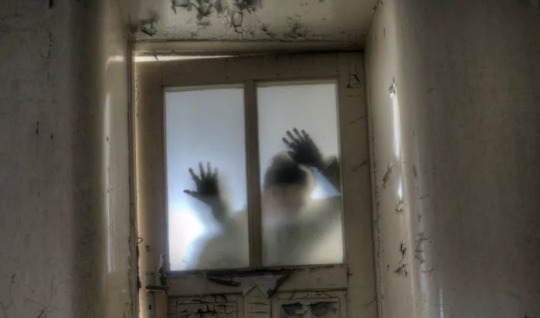
Word Count: 2,7 k
Pairing: Simon “Ghost” Riley X F! Reader
Content: zombie apocalypse, mention of dead bodies, mention of death, children
Summary: A virus has taken over the world, turning people into zombies. Amidst the chaos, Simon has managed to stick together with the other operators of Task Force 141, his life barely any different than it was before. That is, until the day he crosses paths with a woman that keeps a well hidden secret and holds something he has long forgotten existed: a baby
Note: This is my first fic (and first tumblr post)! Hopefully you’ll enjoy reading it as much as I enjoyed writing it. I already have the story planned out, and will be posting the next chapter soon if anyone cares about this. If not, I’ll pretend I never posted this lol
.
.
.
Sitting on the back of the Humvee, Simon could almost believe that things were normal. The constant hum of the engine numbed his mind, as he stared into the sewing of the padding covering the old seat. Soap was seated directly across from him, blabbing his mouth to Gaz, who acted like he could hear anything besides the huge vehicle's obscene noise. Behind the steering wheel was his Captain, Price. Although, that didn’t seem to matter anymore. Not ranks, not names. Nothing was normal, and the reality outside that Humvee was something Simon, not even in his worst days, ever believed could happen.
He had witnessed bleak images. Cruelty in abundance. But the world he saw now was unlike anything he had ever seen before - the dead, roaming among the living. Not that he hadn’t encountered his fair amount of corpses, after all, that came with his job. But this, seeing the bodies of civilians, once full of life, now life-less and decaying at an evolving speed, nonetheless persisting, chasing the taste of human meet… It was different.
When the early signs of the apocalypse started to show, most of the people downplayed it, him included. He had always been a skeptic, and it just didn’t seem viable that a virus could bring down humanity with such strength. Regardless, Simon hadn’t been too worried about the so-called “end of the world”; He thought that his military ties would be enough to keep him informed with privileged intel of the real situation.
He had been deployed with the 141, far from civilization, when shit really went down. For obvious reasons, they came out empty-handed from the recon mission. Turns out terrorism doesn’t come first in the list of the insurgent’s priorities when there is a deathly virus going around. It was only at his team's fruitless attempt to land back at base that he found out that his ranks and years of service didn’t matter when the world was collapsing. They had been out for long enough that, when they came back, there was no more government in place. No hierarchy to follow, and no rules to structure society. And no one cared about them enough to let them know beforehand.
Some people had stayed in their houses, probably clutching their kitchen knives close to their hearts while they heard their neighbor's inhuman noises. Others had divided themselves into smaller groups, in the hopes of giving humanity a fighting chance. The lucky ones had made it to what once were the quarantine zones, now just simply a bigger group of people that managed to stick together and with far better resources. From there, all the typical apocalyptic mayhem developed: gangs, revolutionary groups, miracle safe spaces, cults, and so on. The chaos you would expect to see in a movie. Apparently, they weren’t that far from reality.
Along with the 141, Simon fell into the “smaller group” category - not that the four men would give humanity a fighting chance, they just didn’t really have anywhere else to go. Being military men, their lives revolved around structure and order, so it was natural for them to stick together. Whatever ties to the old world they had before had long been severed, and quickly they realized that it was less painful to hope that anyone they cared about had had the privilege of dying a quick death.
Not that that mattered to Simon either. He didn’t have anyone. So sitting at the back of that Humvee they had stolen from an abandoned base, things didn’t feel that different from what they used to be.
Soon enough, the group expanded, thanks to Soap, who had managed to fix an old radio and get in touch with a few other military personnel who were scattered around the globe. That is how they found Laswell: she had managed to seclude a select group of people from the military in one of the bases that were abandoned in the turmoil. They didn’t mention that she never tried to contact them while they were away on that recon mission, and she didn’t bring it up either. Now, over two years had passed, and the topic was long forgotten.
They were a bunch of people tied together by the hope they could still save humanity: scientists, agents, medics… Everyone had their place in the small society Laswell had created. And Simon… Well, he was a soldier. And soldiers are always useful when in the right hands. That was why things hadn’t changed much for him, and for the first time in his life, the fact that he never had a home to come back to was a relief.
Price was currently driving towards an abandoned research post, that had once been filled with people working to find a cure for the virus that plagued the world. Now, it was just a pile of junk and hopelessness, where Laswell swore they could still find valuable intel - maybe someone had forgotten to scrub their hard drive, or left behind a notebook with notes. At this point, even a post-it with bullet points would be considered a success.
As they pulled up to the location, they decided to park a few meters away from the entrance and proceeded with the skillfulness of a well-oiled machine. Soap and Gaz cleaned the era, taking out the few zombies in the vicinity with their knives, as Price and Ghost scanned for any intelligent life form that could possibly cause trouble. Not that they were expecting to find anything, it was just a precaution, as anyone who once lived there had either fled the area or become another roaming corpse.
They were about to follow the small dirt path that led to the makeshift building when Gaz held up his hand, a signal to stay put, while he used the other to hold the thermal vision glasses to his eyes. “I’m reading two heat signatures - one small and the other even smaller. Looks like it could be a woman and a child. The woman seems to be armed.”
“Let me see this, Gaz.” Says Price as he analyzes the scene himself. “He is right. Two signatures, one is armed.” Gaz makes a look of mock surprise behind the Captain, as he hadn’t just said that. He had become a lot more sassy since he could not be demoted.
“What do we do now?” Soap asks. “It’s not like we can just shoot a kid.”
Price pretends not to hear the last sentence. “I will approach, unarmed. They are probably just scared and trying to find a safe place to live. I’ll tell them we can give them some of our food if they come out and let us take a look at the place.” Before anyone can suggest an alternative, the Captain is removing his guns from the holster, and making his way towards the old science lab.
He is only a few feet away when the sound of gunshots fills the air. The bullets, all aimed just inches away from the captain’s boots, trace a line as if saying “Do not come any closer”. Immediately, the rest of the 141 aim their guns at where the shots came from, taking cover behind the trees, waiting for permission to shoot from the Captain, one that never comes.
“STAY THE FUCK AWAY!” A woman’s voice rings in their ears. This confirms part of what they had seen in the thermal goggles: there was a woman inside and she was, indeed, armed.
“I just want to talk, kid.” Price states calmly, standing his ground. He doesn’t take a step forward, so the shooter doesn’t feel challenged, but doesn’t take a step back either. He is not a man that backs away from a fight. “Name’s John. No need to shoot”.
“You can tell that to your men.” The woman is positioned behind a window, the scope of her gun pointing fearlessly at the bearded man. Not expertly, Simon notes to himself, as he can see the slight tremble that reverberates through the metal parts. Although her voice screams confidence, he can tell the person behind it is not as courageous. But she would probably still shoot that gun - Simon has seen more people pulling triggers out of fear than bravery.
“Alright. Stand down, boys.” And they do. “We just want to take a look around, we don’t want trouble”
The woman laughs. “You say, as you carry automatic weapons and wear a bulletproof vest.”
“Just protecting myself from these troublesome fellas around. You know, the ones with their face falling off, trying to eat people.”
“We both know no one needs that much gear to fight some brain-dead walkers.” She doesn’t seem to want to match the light-hearted tone John is trying to bring to the conversation. “Now get out, or my men will shoot you.”
Now it’s Price’s turn to laugh. “Sweetheart, we both know there’s no one else there with you.” He puts both his hands on the shoulder straps of his vest. “That is, except for the child.”
John was just trying to assert his dominance by showing he had more information than he had let on. However, an angry string of bullets directed toward his feet, again, showed that the comment had struck a nerve. “Get out.” She said through gritted teeth, loud enough for him to hear. “Or the next ones are going straight through that stupid fucking hat of yours.”
“Listen here, kid.” The Captain was angry now. He didn’t like when people commented on his hat. “I have three men ready to shoot your ass into oblivion if you don’t comply. If you can’t tell, they are military-trained, and they will have you down before you can aim at my stupid fucking hat. So quit being dumb and put that gun down.” It was surprising he had let her go as far as shooting at him twice, but he was done negotiating.
“Are you with the Resistance?” Simon almost wants to laugh at that name. The Resistance was a group that, surprise, surprise, wanted to resist the Government. People have too much faith in the Government, in his opinion, as it had crumbled before he came back from his mission. To be fair, it had been a long mission, so maybe he was being a little harsh. Now, the Resistance was a group of rebels that had nothing to rebel against, and who, ironically, had become the closest thing to a government you could have nowadays.
“No, we are not.” Simon could tell John’s patience was wearing thin. He isn’t a big fan of the Resistance either. “We are a group that’s still trying to fix things in this goddam world and that lab might have valuable information. Now let us through.”
At that, the woman puts the gun down and stands up. She probably didn’t know that, but by the tone of his Captaion’s voice, she had probably taken her last chance to avoid a conflict. “Name’s Y/N.” She says. Simon can see her face now - she looks like she is in her early twenties, with long hair tied in a tight ponytail. She disappears behind the window again, coming out the front door with a baby in her left arm and a pistol in her right hand. “I’m keeping the gun.”
“Suit yourself. Come on, boys.” With that, the three of them are taken out of their trance. He knows what they were thinking because he was thinking the same. Who in their right mind has a baby in the middle of a zombie apocalypse? Either this woman was crazy brave or crazy crazy. A baby was a rare sight, a healthy one even more so. But there she stood, baby in her arms and a furious gaze.
They walk past her and her gaze only intensifies. Clearly, the woman was hiding from something, or someone. But that was neither here nor there. They were on a mission, and they were going through with it regardless. Nothing had ever stood in 141’s way.
They don’t ask the baby’s name. Simon had a feeling she might point her gun to his head if he did. Not that he was curious, he could care less about the women or the child.
She doesn’t ask their names either. After all, there is no reason for formalities. If all goes well, they will be gone as suddenly as they appeared.
Inside, the lab was what you would have expected, except for a few things that showed that someone had been living there. It wasn’t hard to find their way around the place, although incredibly annoying to do when there was a five-something-foot-tall woman following them around with a disapproving look. He understood - after all, they were in her house. However, that wasn’t even a house in the first place. Simon tried to mock an equally disapproving look while scavaging for something useful. As if reading his mind, Johnny asks “May I ask why you are living here, of all places? I mean, there are real houses across the street, lass.” Always a gentleman, he was. He could tell the scot had put real effort into that sentence not to sound judgmental.
The building wasn’t too messy, courtesy of the current tenant. It wasn’t too big either. It resembled a house from the outside, and had two stories: the bottom floor looked pretty much like a regular house. It had one room filled with a not-so-normal number of beds, a bathroom, a simple kitchen, and tables everywhere, where it looked like people used to do research and eat, probably simultaneously. The top floor, on the other hand, seemed like something from another world: Wires covered the walls, feeding energy to dozens of different lab-related equipment. Some were big, some were small, and Simon couldn’t name them if his life depended on it.
“The place runs on solar energy. So the showers and appliances installed still work. Except for the cameras, I shut them down a long time ago, along with all this science crap.” So Simon’s intuition was right, she was hiding from something, and knew too much about the place for her to just have stumbled upon it on pure luck. They had already looked at the cameras and made sure that they weren’t working. They were small, installed mostly where it looked like the scientific research went down and at the entrance. She must have been looking for them, as he was pretty sure a regular civilian wouldn’t have been able to spot all of the cameras. But she did, despite the fact that it looked like those were the parts of the house that she used the least. And although Simon's first reaction was to be suspicious, he couldn’t deny that part of him was impressed.
“Smart.” Gaz said, but his tone seemed to reflect some suspicion as well. He had been sitting down in front of a computer since they arrived, trying to recover any data, while the rest of them tossed things around. Unfortunately for them, the scientists who had previously worked there had remembered to scrub the place clean - no documents or information was left behind. “Price, I think I got something.”
Whatever Gaz had been doing in that giant computer, seemed to have worked, as it looked like files were being restored. But the victory was short-lived, and they hardly had time to gather around the machine before the energy shut down. “What happened?” Soap asked.
“I don’t know, it looked like it was working.” Gaz proceeded to furiously tap the keyboard, probably having no idea what he was doing.
“Well, get it to work again then.”
“It’s not that simple, Soap.” As fast as the power went out, it came back on, and the distinct beep of the weird machines splattered around the place could be heard again. “It seems like the whole place rebooted. It was probably easier for them to have all the controls gathered in one place. Simpler.”
But Simon wasn’t focused on Gaz’s explanation. He was focused on the cameras, that he had physically confirmed were shut down, now red light shining bright. Apparently, the machines weren’t the only thing that had turned back on. “Shit.” He heard the woman say behind him. Her face was pale, and she hugged the baby tightly, shielding the child’s face against her chest.
Whatever she was hiding, Simon was willing to bet all his money it had to do with that baby.
#simon riley#simon ghost riley#simon ghost riley x reader#simon ghost x you#kyle gaz garrick#john soap mactavish#john price
229 notes
·
View notes
Note
What do you think of this? I think most of it is ridiculous, but I’m not that familiar with all of these moments, so I’d like to know your thoughts.
https://www.tumblr.com/allnewalldifferentwildspider/759267251779141632/so-kataang-arguments-always-shift-between-aang-is?source=share
What a load of bullshit. The most mature 12-year-old in the whole world is still just 12, much like the most mature 14-year-old in the whole world is still just 14.
Aang and Katara are both mature enough to understand LOTS of complex stuff (mainly how to handle their own trauma, and each other's, whiel they try to save the world) but they both still make lots of mistakes children their age would - hence Katara making a REALLY uncalled for joke about Toph's blindness during a fit of rage, or telling Sokka he didn't love their mom as much as she did, or, yes, Aang being confused by the concept of "Someone can have feelings for you but not be sure if they wanna date, and you can't speed up the process, just give them time to figure it out on their own"
"Is he mature enough to date a teenager?" Zutarians LOVE pretending the Kataang and Zutara age-gap isn't exactly the same, don't they?
And hell, since I mentioned Zuko - the boy just recently discovered the "revolutionary" concept that a parent disfiguring their own child is bad, he had a real jealousy and paranoia issue with Mai, an inferiority complex towards his sister, and he basically gave himself the Dai Li treatment in Ba Sing Se to please Iroh.
His understanding of boundaries, trust and what counts as abusive behavior is canonically all messed due to how he was raised, to the point that he constantly either accidentally hurts the people he cares about or gets taken advantage of, even by people who don't mean to hurt him, because he simply doesn't know how far is too far. He is constantly either being too demanding, and lashing out with verbal abuse whenever he doesn't get what he wants, or bordeline setting himself on fire to keep someone else warm.
Despite being older than them, Zuko has a much more immature, warped and often toxic view of relationships (and not just romantic ones) than Aang and Katara - yet zutarians never say that means he is forbidden from wanting love or getting into a relationship to try and figure things out, and that liking any ship with him is "problematic" or "creepy".
How convenient.
40 notes
·
View notes
Text
Sometimes self care is rewatching Dune (2021) and going on and on about ‘the symbolism of this or that’ or how ‘something here is a nod to the sequels’ or ‘look how the casting characterizes the house atreides’ or ‘the music here is phenomenal, it foreshadows gurney’s fate later on’ or ‘I think the difference in the vocalizing in the soundtrack here is deliberate’ until whoever you’re watching it with is ready to commit murder to shut you up.
But it’s just so phenomenal that you can watch it and catch new things each time, the visual and auditory storytelling in the background gives you so much! All these little things that go unnoticed until you see and want to jump out of your seat at them, let’s talk about that.
Let’s talk about how Jessica is always hooded when her scenes are associated with her Bene Gesserit powers and upbringing, how you can literally watch her out her hood down or up mid scene as she transitions from mother and concubine to an obedient disciple, how it foreshadows her struggle in the books all the way through Children of Dune.
Let’s talk about how well done the foreshadowing of the jihad is, how even this early on we can see the start of what is integral to Paul’s conflict in Messiah, how that feeling of helplessness about a destiny he doesn’t want will keep him frozen and unable to stop what’s in motion, how Messiah is such an incredible book because it ties into the dystopian trope wherein revolutionaries become like those they once revolted against, but how it’s so much more fascinating than some of the ways we see it in modern dystopias, because it’s the main characters who are following the pattern, not just watching in horror as those they fought with change for the worse, but actually experiencing it, horrified at what they’ve done and what they will continue to do, frozen and so unable or unwilling to do what needs to be done to stop it, how the movie is still in the stage where they are noble and valiant, but it makes sure to show the dread of what it coming, how it does such a good job of showing the burden of foresight that is so integral to Dune, the way that even as they see the future and can attempt to change it, they know that no matter their decisions, horrible things will come, how it shows Paul as scared hating the power he was given and blaming his mother and her aspirations, how the atreides family never wanted to be great, they wanted to be good, how Paul is coming to see that great and good cannot always coexist, how you look at this boy and you can genuinely see how he will become the man saying ‘Believers, all of them’ how Dune is such a hard story to get right because you watch someone devolve and stand by why horrible things are done without seeing him as a terrible person from the start, without the boy and the man seeming irreconcilable from one another, how the movie actually is on the right track even though the end result is unpalatable to the majority of society, how they are showing the white savior trope in a way that is thus far complaint with how it is deconstructed later on, how they have the epic notes of the beginning without going in a direction that makes the ending impossible.
Let’s talk about how they cast the Atreides family as beautiful people, but not soft, not tamed to modern standards, aristocratic in their looks in such a way that you believe they have been nobility for centuries, maybe millennia, slightly untouchable, dangerous, like those in power during the Italian Renaissance, how Paul looks young but also ethereal and formal, the balance between boy and duke and messiah in his appearance, how Leto’s hair and beard make him not only regal but worn by politics, cold and formal yet fatherly all at once, how Jessica’s ghostly pale complexion nods to her Harkonnen ancestry in the books and how she is beautiful in a way that seems not entirely human, how the other members of the Atreides house are each unique and full of character, not designed to fit a palette or aesthetic, whereas the Harkonnens have an eerie similarity that shows how little they value free will, how the Harkonnens are not dramatized to emphasize their characterization but rather understated, devoid of emotion save for rare explosive moments, how they echoed this in their design, making them blank slates, taking away rather than adding, leaving them almost human, but not quite, enough to trigger that ancient animal instinct in a person that says ‘something is wrong here, something is dangerous’ rather than making them fit in with the conventions of a time period or trend as to how to look evil.
Let’s talk about the soundtrack, how the epic music playing when House Atreides lands on Arrakis is echoed as Gurney and his men charge at the Harkonnens who so greatly outnumber them, how this not only ties you emotionally to the battle, hearing this dying cry of the Atreides, more so than the music continuing to be dark and foreboding through it all, but also how it foreshadows the survival of Gurney and the small group of men with him, living to reunite with Paul later on.
Let’s talk about how throughout the soundtrack we have women vocalizing, the emphasis on the power of the Bene Gesserit and how in Leto’s death scene we diverge from this trend, how he was so powerless against all these grand plans but he still took a stand, still ended things on his own terms.
Let’s talk about how Jessica doesn’t answer when Leto asks her to protect Paul as a Bene Gesserit. Let’s talk about the bull and the matador, the symbolism there. Let’s talk about the emphasis on medieval and renaissance headdresses on the Bene Gesserit, the significance of choosing attire from a time when the Catholic Church was in the peak of its power. Let’s talk about the nods to Gurney’s music. Just, look at all this stuff in the movie that you barely even notice, the first time. All the planning that went into it, how to fit in all these little nods, how to stay true to who the characters are in the present while also beginning to show who they will become. Let’s talk about it.
Though maybe not to the people I was watching the movie with. I don’t actually have a death wish.
#dune#dune frank herbert#paul atreides#children of dune#dune messiah#lady jessica#leto atreides#dune 2021#visual storytelling#soundtracks#movie appreciation#wow this got long#that part in messiah when he says ‘believers’ hits me like a punch in the gut
490 notes
·
View notes
Text
A thought I have been idly turning over is that the argument can be made - and made pretty compellingly imo - in both directions that the changes from Cassian’s sketchy offscreen backstory in R1 to that presented in Andor serve to portray him as a more/less uncomplicatedly sympathetic hero and/or victim of imperial violence.
On the one hand “traumatized refugee orphan turned hustler, saddled with a juvenile record and nursing a self-protective apathy approach to politics, radicalized by the proverbial straw(s) that broke the camel’s back after a lifetime of survival in a system that wants to kill him” clearly complicates the narrative from “I’ve been in this fight since I was six years old.” And quite frankly, hard NOT to complicate the narrative when you’ve got an entire TV series to stretch your narrative legs in vs a single film with an ensemble cast. I don’t think it’s entirely fair to suggest that a story which has vastly more space to expand on an idea necessarily has smarter things to say so much as more space in which to say them - but I do respect the commitment to complication and interrogation, nonetheless.
On the other hand the implication of R1 - made extremely albeit briefly explicit in the offscreen references to, and I quote, Outer Rim “anarchist movements” and children “tossing rocks and bottles at Republic walkers” (no further comment at this time but like…oof) - is not, imo, a less thoughtful or complicated or potentially subversive story. Some of the complexities certainly lie in different places! But I don’t even think that such questions as “Does a slightly-selfish-on-the-surface grifter ask more from the audience than a dedicated idealist?” are as straightforward as they initially appear, within the broader context of a media landscape that is frequently far more comfortable lauding revolutionary action as a variation on a revenge plot (Everyman Hero just wanted to keep his head down and live his life until Evil Empire killed his girlfriend/family/best pal/etc etc) than as a natural outgrowth of ideological conviction (which is for Scary Radicals*). I also continue to find it UNBELIEVABLY tantalizing that R1!Cassian was explicitly described as, if not a Separatist himself (hard to describe a six year old that way or know how he would describe himself as an adult!), then unquestionably part of that ideological lineage, in that Star Wars as a franchise has never been willing to give more than halfhearted lip service to the idea of Separatists as anything but cartoonishly over the top villains - or, by extension, to the idea that the Republic was the Anakin Skywalker to the Empire’s Darth Vader. Even in highly abridged form, that’s a backstory that’s begging a lot of pointed and fascinating questions (What are the political fault lines within the Rebel Alliance? What does it mean that this franchise’s treatment of the Clone Wars has frequently boiled down to glibly setting up and knocking down arguments about Third World sovereignty and resource extraction? Can you as the audience imagine a political movement that contains both incredibly corrupt bad actors and grassroots liberation movements under the same broad ideological umbrella?)
ANYWAY TL;DR I think there’s a lot that’s spiky and unstraightforward and potentially subversive about both of those backstories, and I don’t think you need to dismiss the complexities of either in order to appreciate the other.
*I am OFC not saying that Andor doesn’t engage with ideological conviction, because it does! I am merely pointing out that - outside the audience demographic of broadly left-leaning people on tumble - a loveable rogue who wants to stay out of politics and survive does not necessarily read as less likable or morally upright than a revolutionary who’s fully prepared to Die For The Cause.
#i do think star wars has done one of these stories far more often but i don’t think either is uninteresting#also why does this feel like such hdu say we piss on the poor discourse bait lol#i am not discoursing lads i am contemplating. musing. idly analyzing. rotating thoughts in my brain.#andor#rogue one#star wars#cassian andor#my posts#my separatist feels
43 notes
·
View notes
Text
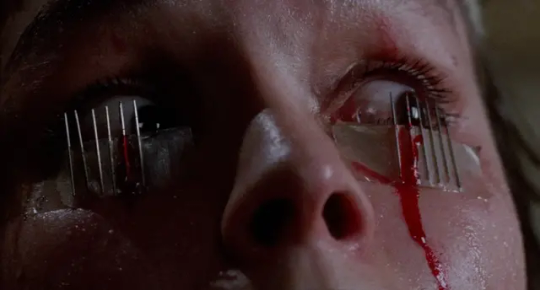
So I'm in the middle of this research project centered on Dario Argento's OPERA, for which I have required myself to watch as many screen adaptations of the Gaston Leroux novel The Phantom of the Opera as I can take. What I have determined so far is that the Phantom of the Opera is a story everyone wants to tell, but not very many people are sure of how to tell it. In fact, it's not that easy to say what it is about archetypally. You know, Wolfman stories are typically about "the beast in man" (with femininity positioned as some sort of cure for this personality split), Frankenstein stories are usually about human nature (i.e. an uncanny creature can have more humanity than vain and bigoted humans), Dracula-type vampire stories are most generally about the problems of being an outsider (queer, foreign, etc). But Phantom of the Opera is like...well, everyone likes the love story part of it, which is more or less modeled on Dracula, with a woman torn between seductive darkness and the safety of square society. But then there are all these other parts that seem to flummox people in the retelling.
I haven't read the Leroux novel YET but the first round of movies have been interesting, and also sort of perplexing. The iteration from 1925 holds up, largely due to Chaney's creation of the Phantom which remains a top tier monster. People don't often talk about the mask though! Which looks like a cross between Peter Lorre and the Devo Boogie Boy, it's disturbing and I like it.
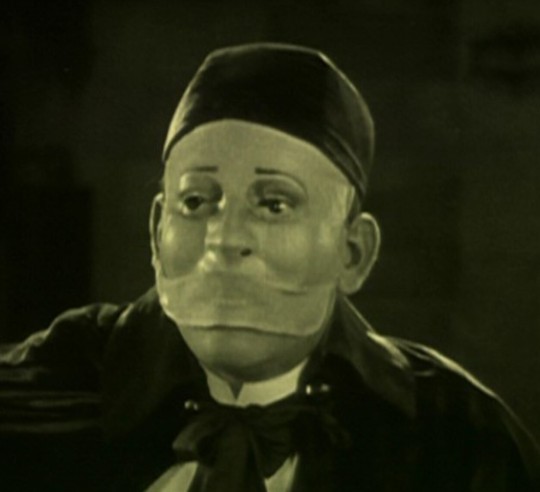
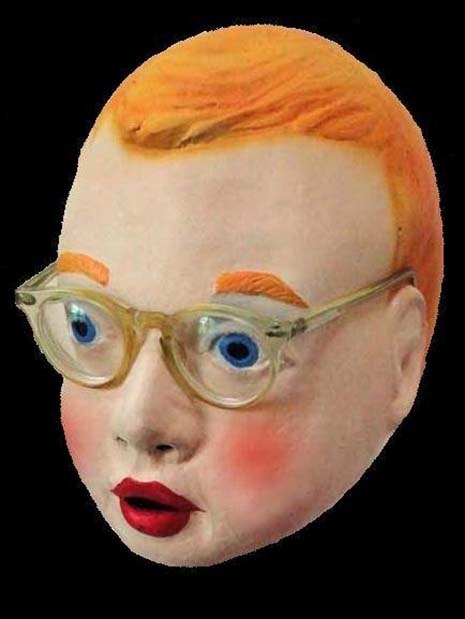
This Phantom was born in the dungeons during a revolutionary bloodbath and is disfigured from birth, drawing on the antique idea that a mother's trauma is translated in the deformity of her children; also, compellingly, these dungeons lie fathoms beneath the opera house where the bourgeoisie are witlessly dancing on the graves of martyrs and criminals embodied in the Phantom. The ingenue Christine is an interesting figure who breaks up with her boyfriend at the beginning because she wants to give her whole self to her career; when the Phantom starts murmuring to her through the walls it's as if the spirit of opera itself has chosen her to be its avatar, which she seems to find totally rational. It's sort of cool, what other movie of this era has a likeable heroine choosing her potential for greatness over love? This is the element of the story that is the most interesting, but I'll expand on that in a minute.
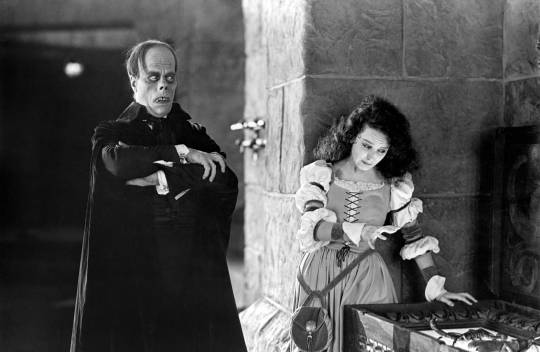
The Chaney edition benefits a lot from keeping things simple. The 1943 version with Claude Raines has a little bit too much going on and the story doesn't get a lot of time to congeal between so many long opera sequences; this movie really takes the opera part of the title seriously! Actually they're the best thing about it, mostly because of Nelson Eddy who is extremely beautiful and a real opera singer, and who projects this blazing desire for Susanna Foster that is incredibly convincing. Like I'd normally say they have great chemistry, but I think it's just a lot of power radiating from him specifically.
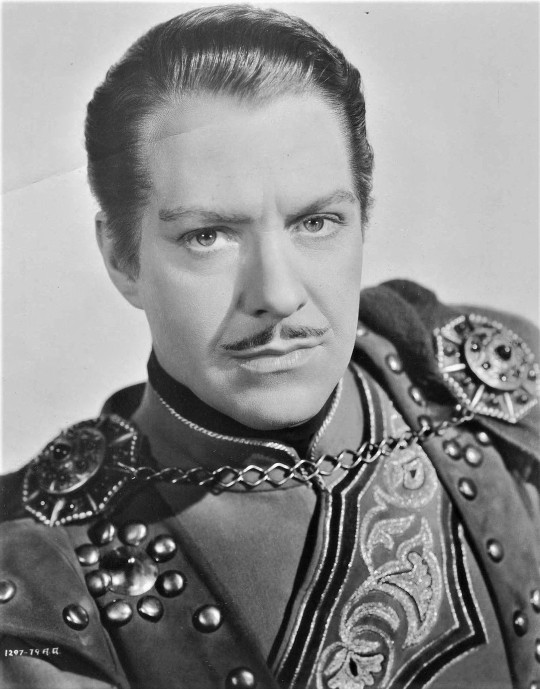
Ahem.
Uh anyway. This movie picks up the reoccurring (but not universal) idea that the Phantom is a genteel and sophisticated composer who has just fallen on hard times, who goes mad when his latest concerto is stolen. He is disfigured while struggling with the plagiarist and installs himself under the opera house where he can haunt his former protege Christine, who is already torn between dreamy Nelson Eddy and her stuffy cop boyfriend. One of my favorite things here is that even though this film is extremely quaint and old fashioned, everybody hates cops; this Christine is less a self-determined careerist than someone who is under pressure from her artist friends who find it profoundly repulsive that she is dating a policeman. Meanwhile the Phantom is just way too gentle and sappy, which is extra disappointing because Claude Rains's Invisible Man is so fabulously chaotic and sadistic, it made me really aware of the Phantom that could have been. This one doesn't properly represent the high society vs. underworld dichotomy that Christine should be torn between. So what is this movie about? There's so many guys in it and a few different themes flapping in the breeze. Is it about love? Is it about self-actualizing through art? Is it about the cutthroat world of showbusiness? It doesn't have that much to say, ultimately, and it just seems really unmotivated. Also I don't like this mask, sue me.
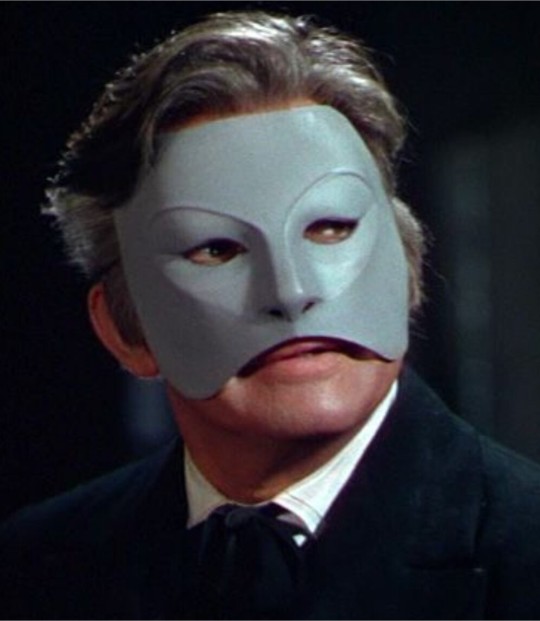
The Hammer edition is even more disappointing, considering the studio's previous successes with Universal Monster remakes. Here Christine is torn between a suave opera producer, the lecherous composer who has plagiarized the Phantom, and yeah the Phantom. Too many guys, it confuses whatever the dynamic and themes are supposed to be. Michael Gough as the plagiarist is so much more evil and threatening than poor Herbert Lom's Phantom that it's hard to stay focused on the main point here. Curiously the Hammer version is rather unromantic, with the Phantom just slapping Christine around until she sings his tunes right; that is kind of refreshing in a way, although it also means that the film lacks tension, which contributes to its being surprisingly anticlimactic. The best guy in the movie is actually Thorley Walters whose character serves almost no narrative purpose at all, he just hulks around with this WTF? look on his face and it is kind of adorable. I guess I like the gross mask in this one, too.
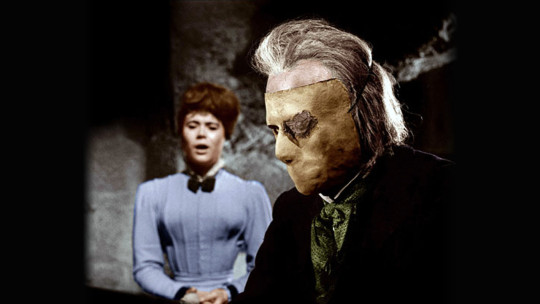
But the Hammer version has one interesting strength, which is that Christine is singing the lead in a new opera about Joan of Arc. Just like Joan, Christine hears a disembodied voice prophesizing her ascent to power. The best thing about the Phantom lore is the idea that the woman has this latent power that can either be activated by the Phantom, or suppressed by her square boyfriend (the relationship being mutually exclusive with opera stardom in many iterations). She isn't just a love object to be possessed, she herself possesses of some kind of devastating energy that needs to be awakened and channeled--or contained and forgotten, if she decides to get married and stay home or something. This is pretty cool, and it is interestingly realized in Dario Argento's OPERA, in which (spoiler alert I guess) a killer stalks an opera singer with the aim of catalyzing her own latent psychopathy. This idea is at the center of my thesis and I'm looking forward to fleshing it out, although I'm kind of dreading all the other PHANTOMs that I have committed myself to watching. I really don't want to deal with Andrew LLoyd Webber at all, but after I get through at least the Joel Schumacher one of the those I'm going to reward myself with a rewatch of PHANTOM OF THE PARADISE which I'm going to guess right now is the best retelling of this story after the Chaney one. I'm counting on Paul Williams' music to be catchier than Webber's.
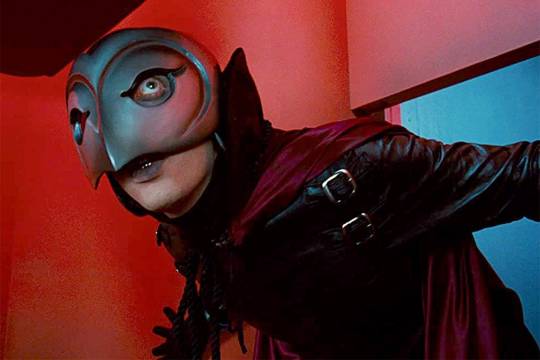
I'm whining about my own decisions, I know, but really the main hardship of this project is that now I keep getting the Vandals' punk theme song from PHANTOM OF THE MALL: ERIC'S REVENGE stuck in my head, and let me tell you that is very unwelcome. Here it is, if you've decided you're done being happy and sane:
youtube
#is this when i finally watch KISS MEETS THE PHANTOM OF THE PARK?#is this project going to destroy me#phantom of the opera#claude rains#lon chaney#herbert lom#dario argento#opera#Youtube
51 notes
·
View notes
Text
"The Wounded Sky" review
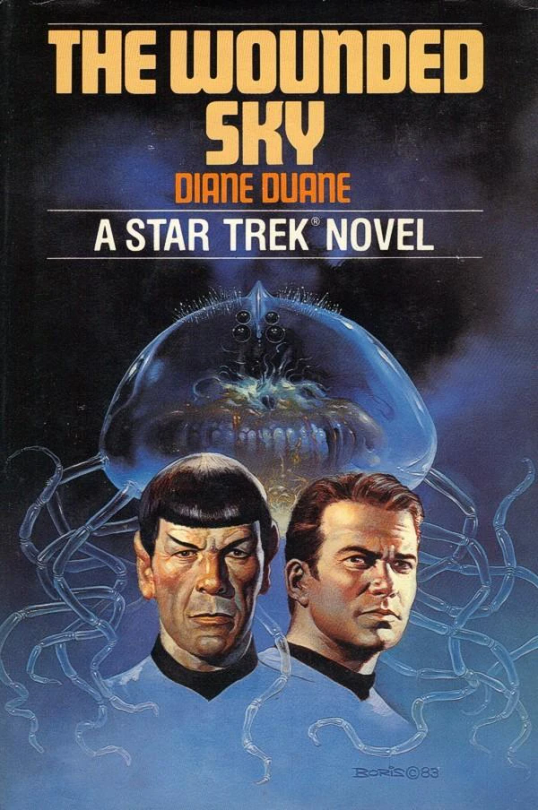
Novel from 1983, by Diane Duane (I had read some TOS comics, and even played a text adventure by this same author, but this is the first novel I read).
Very bizarre, very imaginative. You'd probably have to go back to "Planet of Judgment" (1977) to find a similarly unusual TOS novel. Most of the "action" unfolds inside mental landscapes (and that's not even a proper description; the situation is actually far more complex than that).
At times poetic, at times metaphysical, it's a more difficult novel than the standard TOS light literature, though there are also many humorous moments.
The aliens are remarkable for how truly "alien" they are, which produces lots of absurd (from a human viewpoint) situations. There's a species who only see in infrared, and needs properly heated cards to play poker. A feline alien that doesn't have language to express the passage of time. Another species with twelve sexes, all of them male (specially the ones who bear children). And glass spiders with an altogether different understanding of physics, who spend a lifetime building a nest of memories to pass to their offspring, and then die at the time of mating.
I haven't read any novels by Terry Pratchett, though I know about Discworld from the videogames, but may I say there's something "pratchean" in all this?
In many ways, this is a fascinating novel. But is it a good representative of a Trek novel? I'm not sure.
I feel the scope and the depth of this story is a bit constrained by the Trek frame. The TOS series, and even the movies, had a smaller scope: interpersonal problems, specially among the big three, or political conflicts. The aliens were usually very human, and represented different human societies/worldviews. Even when more alien creatures appeared, like the gas cloud from "Obsession", the story was really about Kirk's very personal demons.
So maybe this novel would have benefitted if it was set in its own, independent sci-fi world, that provided the needed freedom to explore the larger cast and variety the story strives for.
I'll try to summarize the plot, though this is over-simplifying, since "themes" are more important here than "action".
Spoilers under the cut:
The Enterprise is tasked with testing a new revolutionary invention, that will allow ships to travel instantly as far as they want, even outside the galaxy.
The artifact in question works by "inversion", sending the starship to a different dimension where time doesn't exist, and popping it up again at the desired coordinates. Since there's no time involved, there's no damage done to ship and crew. Theoretically.
Well, what could possibly go wrong?
They take aboard the artifact, along with its Hamalki inventor: K't'lk (pronounced "ketelk", I think). She's the glass spider from the cover, and thus far, takes the prize for most unusual "lady of the week".
K't'lk soon becomes best friends with Scotty, though the engineer struggles to understand the nutty physics of the Hamalki.
For his part, Kirk has a conversation with her about the reproductive habits of her species, during which K't'lk weaves a strange crystal sculpture, and gifts it to him.
She also makes a demonstration of the inversion process, without changing the ship's coordinates. But Kirk can't feel anything, except a vague dizziness.
However, soon after leaving the starbase, the Enterprise is attacked by Klingon ships which desire the inversion apparatus. Sulu manages to outmaneuver them, sending the Klingons into a nearby star, which becomes nova right then. The Enterprise escapes the explosion in the nick of time, by activating inversion and leaving the normal plane of existence.
And this time, the crew has indeed strange (but blissful) experiences during inversion. For example, Kirk finds himself living as if he was the starship itself, and this had a conscience of its own.
Upon reappearing in the normal universe, they find out the explosion somehow messed up the coordinates, so they're not anywhere near the Lesser Magellanic, which it was their mission to investigate. Also, the nearby star is going nova too. Coincidence again?
Activating inversion once more, this time they're placed in the correct coordinates. But with each subsequent, longer jump, the inversion experiences are becoming weirder, and individuals start merging with other crewmembers, and seeing things from their viewpoint.
Finally, things get more sinister once Kirk reappears with real wounds, that he thought were just the product of his mind. And even worse, the Lesser Magellanic, now nearby, is showing the most disturbing anomalies.
Entropy has simply ceased to exist at some points. And it seems the longer jumps with the inversion apparatus have caused this, by ripping the fabric of the universe. Thus, a new universe without entropy is sipping through the tear, and threatens to destroy everything. (It's funny how the problem in "The Entropy Effect" was that they had too much entropy, while here they have too little. If they just left it alone...).
K't'lk is sure she can close the rip between both universes, but to do so, they'll need to make a final jump right at the center of the anomaly.
The climax of the story happens entirely inside the mental world of inversion. Which is highly malleable by thought, given the progressive rupture of natural laws. Also, the flux in entropy is represented by ascencing and descending slopes in the landscape.
However, they can't close the rip immediately, since they discover a living, god-like being (called simply "the Others"), who would be destroyed in the process. Before that, Spock must join in a group mind-meld with other crewmembers, to give the Others self-awareness, and explain the situation.
K't'lk must also stay behind with the god, to weave new natural laws for Them to live in. And she puts forth this universe by singing (echoes from Tolkien's "Silmarillion"? might be, since a forest called "Lorien" appears at one point).
Once everything's fixed, and the Enterprise is back in Federation space via smaller jumps (that won't mess up the universe too much), Starfleet decides that the inversion apparatus is way too dangerous in its present state, and must not be used.
Meanwhile, everyone misses K't'lk. But when Kirk accidentally breaks the crystal sculpture that she gave to him, he discovers it was actually an egg. A new, small K't'lk emerges from it, and quickly runs to greet Scotty.
Spirk Meter (or rather McSpirk): 5/10*. During inversion, Kirk gets to see Spock and McCoy's true, deepest natures, and he's in awe with what he finds. First, he's blinded by McCoy's compassion, and the doctor's touch on his arm both reassures and bewilders him. Then Kirk is humbled by Spock's desire of knowledge and his superior mind. The three of them are relieved to find such good qualities in the others' souls.
However, the scene is quite abstract, and seems to be dealing more with the characters as ideas, rather than as specific persons. So I don't find it all that slashy really.
As for Spones as such, there's the moment when Kirk finds them walking together, while inside the anomaly, and Spock looks at McCoy with "nearly unalloyed affection".
Kirk also considers that McCoy is more geared towards receiving, in contrast to Spock's inclination for giving... How convenient for them!
*A 10 in this scale is the most obvious spirk moments in TOS. Think of the back massage, "You make me believe in miracles", or "Amok Time" for example.
21 notes
·
View notes
Note
Do you happen to know how often it occurred for wives of arrested deputies to share the same fate of their husbands, so either imprisoned, or condemned to death ? Do you have some examples? I'm referring to the years between 92-95. Moreover if it's not too much to ask for, could you also point out the signature of the CSP members who signed such warrants?
That’s a very interesting question, especially since no official studies seem to have been made on the subject. What I’ve found so far (and it wouldn’t surprise me if there’s way more) is:
Félicité Brissot — after the news of her husband’s arrest, Félicité, who had lived in Saint-Cloud with her three children since April 1793, traveled to Chartres. There (on an unspecified date?) she and her youngest son Anacharsis (born 1791) were arrested by the Revolutionary Committee of Saint-Cloud (the two older children had been taken in by other people) which sent her to Paris. Once arrived in the capital, Felicité was placed under surveillance in the Necker hotel, rue de Richelieu, in accordance with an order from the Committee of General Security dated August 9 1793 (she could not be placed under house arrest in her own apartment, since seals had already been placed on it). On August 11 she underwent an interrogation, and on October 13, she was sent from her house arrest (where she had still enjoyed a relative liberty) to the La Force prison. Félicité and her son were set free on February 4 1794, after six months spent under arrest. The order for her release was it too issued by the Committee of General Security, and signed by Lacoste, Vadier, Dubarran, Guffroy, Amar, Louis (du Bas-Rhin), and Voulland. Source: J.-P. Brissot mémoires (1754-1793); [suivi de] correspondance et papiers (1912) by Claude Perroud)
Suzanne Pétion — According to a footnote inserted in Lettres de madame Roland (1900), Suzanne was imprisoned in the Sainte-Pélagie prison since August 9 1793. In an undated letter written from the same prison, Madame Roland mentions that not only Suzanne, but her ten year old son Louis Étienne Jérôme is there too. I have however not been able to discover any official orders regarding Suzanne’s arrest and release, so I can’t say for exactly how long she and her son were imprisoned and who was responsible for it right now. @lanterne you wrote in this super old post that you’re waiting for a Pétion biography, did you get it? And if yes, does it perhaps say anything about Suzanne’s imprisonment in it? 😯)
Louise-Catherine-Àngélique Ricard, widow Lefebvre (Suzanne Pétion’s mother) — According to Histoire du tribunal révolutionnaire de Paris: avec le journal de ses actes (1880) by Henri Wallon, Louise was called before the parisian Revolutionary Tribunal on September 24 1793, accused “of having applauded the escape of Minister Lebrun by saying: “So much the better, we must not desire blood,” of having declared that the Brissolins and the Girondins were good republicans (“Yes,” her interlocutor replied, “once the national ax has fallen on the corpses of all of them”), for having said, when someone came to tell her that the condemned Tonduti had shouted “Long live the king” while going to execution; that everyone would have to share this feeling, and that for the public good there would have to be a king whom the “Convention and its paraphernalia ate more than the old regime”. She denied this when asked about Tonduti, limiting herself to having said: “Ah! the unfortunate.” Asked why she had made this exclamation she responded: ”through a sentiment of humanity.” She was condemned and executed the very same day.
Marie Anne Victoire Buzot — It would appear she was put under house arrest, but was able to escape from there. According to Provincial Patriot of the French Revolution: François Buzot, 1760–1794 (2015) by Bette W. Oliver, ”[Marie] had remained in Paris after her husband fled on June 2 [1793], but she was watched by a guard who had been sent to the Hôtel de Bouillon. Soon thereafter, Madame Buzot and her ”domestics” disappeared, along with all of the personal effects in the apartment. […] Madame Buzot would join her husband in Caen, but not until July 10; and no evidence remains regarding her whereabouts between the time that she left Paris in June and her arrival in Caen. At a later date, however, she wrote that she had fled, not because she feared death, but because she could not face the ”ferocious vengeance of our persecutors” who ignored the law and refused ”to listen to our justification.” I’ve unfortunately not been able to access the source used to back this though…
Marie Françoise Hébert — arrested on March 14 1794, presumably on the orders of the Committee of General Security since I can’t find any decree regarding the affair in Recueil des actes du Comité de salut public. Imprisoned in the Conciergerie until her execution on April 13 1794, so 30 days in total. See this post.
Marie Françoise Joséphine Momoro — imprisoned in the Prison de Port-libre from March 14 to May 27 1794 (2 months and 13 days), as seen through Jean-Baptiste Laboureau’s diary, cited in Mémoires sur les prisons… (1823) page 68, 72, 109.
Lucile Desmoulins — arrested on April 4 1794 according to a joint order with the signatures of Du Barran (who had also drafted it) and Voulland from the CGS and Billaud-Varennes, C-A Prieur, Carnot, Couthon, Barère and Robespierre from the CPS on it. Imprisoned in the Sainte-Pélagie prison up until April 9, when she was transferred to the Conciergerie in time for her trial to begin. Executed on April 13 1794, after nine days spent in prison. See this post.
Théresa Cabarrus — ordered arrested and put in isolation on May 22 1794, though a CPS warrant drafted by Robespierre and signed by him, Billaud-Varennes, Barère and Collot d’Herbois. Set free on July 30 (according to Madame Tallien : notre Dame de Thermidor from the last days of the French Revolution until her death as Princess de Chimay in 1835 (1913)), after two months and eight days imprisoned.
Thérèse Bouquey (Guadet’s sister-in-law) — arrested on June 17 1794 once it was revealed she and her husband for the past months had been hiding the proscribed girondins Pétion, Buzot, Barbaroux, Guadet and Salles. She, alongside her husband and father and Guadet’s father and aunt, were condemned to death and executed in Bordeaux on July 20 1794. Source: Paris révolutionnaire: Vieilles maisons, vieux papiers (1906), volume 3, chapter 15.
Marie Guadet (Guadet’s paternal aunt) — Condemned to death and executed in Bordeaux on July 20 1794, alongside her brother and his son, the Bouqueys and Xavier Dupeyrat. Source: Charlotte Corday et les Girondins: pièces classées et annotées (1872) by Charles Vatel.
Charlotte Robespierre — Arrested and interrogated on July 31 1794 (see this post). According to the article Charlotte Robespierre et ses amis (1961), no decree ordering her release appears to exist. In her memoirs (1834), Charlotte claims she was set free after a fortnight, and while the account she gives over her arrest as a whole should probably be doubted, it seems strange she would lie to make the imprisonment shorter than it really was. We know for a fact she had been set free by November 18 1794, when we find this letter from her to her uncle.
Françoise Magdeleine Fleuriet-Lescot — put under house arrest on July 28 1794, the same day as her husband’s execution. Interrogated on July 31. By August 7 1794 she had been transferred to the Carmes prison, where she the same day wrote a letter to the president of the Convention (who she asked to in turn give it to Panis) begging for her freedom. On September 5 the letter was sent to the Committee of General Security. I have been unable to discover when she was set free. Source: Papiers inédits trouvés chez Robespierre, Saint-Just, Payan, etc. supprimés ou omis par Courtois. précédés du Rapport de ce député à la Convention Nationale, volume 3, page 295-300.
Françoise Duplay — a CGS decree dated July 27 1794 orders the arrest of her, her husband and their son, and for all three to be put in isolation. The order was carried out one day later, July 28 1794, when all three were brought to the Pélagie prison. On July 29, Françoise was found hanged in her cell. See this post.
Élisabeth Le Bas Duplay — imprisoned with her infant son from July 31 to December 8 1794, 4 months and 7 days. The orders for her arrest and release were both issued by the CGS. See this post.
Sophie Auzat Duplay — She and her husband Antoine were arrested in Bruxelles on August 1 1794. By October 30 the two had been transferred to Paris, as we on that date find a letter from Sophie written from the Conciergerie prison. She was set free by a CPS decree (that I can’t find in Recueil des actes du Comité de salut public…) on November 19 1794, after 3 months and 18 days of imprisonment. When her husband got liberated is unclear. See this post.
Victoire Duplay — Arrested in Péronne by representative on mission Florent Guiot (he reveals this in a letter to the CPS dated August 4 1794). When she got set free is unknown. See this post.
Éléonore Duplay — Her arrest warrant, ordering her to be put in the Pélagie prison, was drafted by the CGS on August 6 1794. Somewhere after this date she was moved to the Port-Libré prison, and on April 21 1795, from there to the Plessis prison. She was transfered back to the Pélagie prison on May 16 1795. Finally, on July 19 1795, after as much as 11 months and 13 days in prison, Éléonore was liberated through a decree from the CGS. See this post.
Élisabeth Le Bon — arrested in Saint-Pol on August 25 1794, ”suspected of acts of oppression” and sent to Arras together with her one year old daughter Pauline. The two were locked up in ”the house of the former Providence.” On October 26, Élisabeth gave birth to her second child, Émile, while in prison. She was released from prison on October 14 1795, four days after the execution of her husband. By then, she had been imprisoned for 1 year, 1 month and 19 days. Source: Paris révolutionnaire: Vieilles maisons, vieux papiers (1906), volume 3, chapter 1.
#frev#french revolution#madame roland is of course here too but she might go in the notlikeothergirls camp in this particular instance#félicité brissot#suzanne pétion#éléonore duplay#élisabeth lebas#charlotte robespierre#théresa cabarrus#lucile desmoulins#marie françoise hébert#everyone: is held in prison from anything from two months to a whole year if not executed before then#charlotte: two weeks…#i mean i’m not surprised but…
53 notes
·
View notes
Text
Chapter 1083: By Any Means Necessary
Color me shocked, but we’re actually following up from last chapter to learn the truth about Reverie!
But first, that cover.

On the surface, it makes me laugh a bit. But, upon further reflection--and I’m going to look way too deep for a cover request--this makes me think of the way Doffy took in children. He’d find these heavily damaged children like Law and Baby 5, he’d wrap them in his coat (give them a place in the Family, make them feel wanted and needed, make promises about the future) while offering only the barest care for their actual trauma, like the bandage here. (In fact, he was actually making the trauma worse.)
See? Way too deep for a cover request 😅
Anyway, on to the chapter:
So, the Revolutionaries had three main aims for infiltrating Mariejois:

I can only imagine that cutting off the Celestial Dragons’ food reserves is going to lead to some dark things. (I mean, even cannibalism hasn’t been off the table so far in One Piece, so...) While the Revolutionaries aimed to help as many slaves escape as they could, you know they didn’t get them all. And the ones left behind are really going to suffer from this.
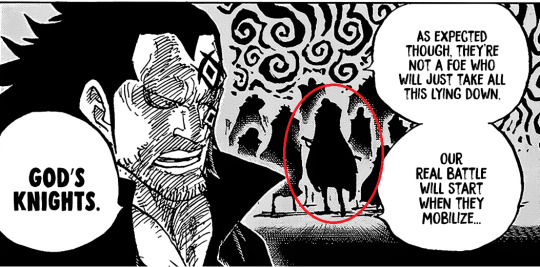
Excuse me, why does this silhouette of God’s Knights look like Shanks?
It’s probably a misdirect (we all know how the silhouettes of Kaido and Big Mom looked before we met the actual characters, after all) but considering the background for Shanks that we got from the Film Red material and the fact that the Five Elders were willing to meet with him... it doesn’t seem out of the realm of possibility. (Or maybe one of Shanks’s family members?)
Side note: on a shallow note, I really like this panel of Sabo:

Anywho, Dragon acknowledges that Cobra was actually a kind and benevolent ruler, but that doesn’t matter for the cause of the Revolutionaries. For the greater good is the type of attitude that leads to those who rebel against the corrupt to become the very thing they were fighting against once they are victorious.
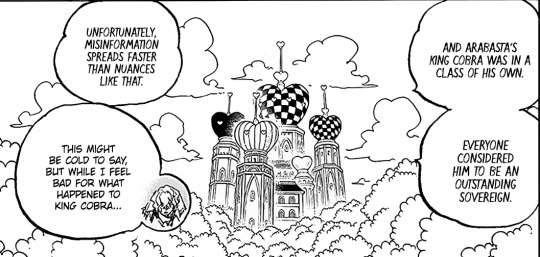
“Unfortunately, misinformation spreads faster than nuances like that” is such a true line.
And Sabo...

The boy is fine being seen as Cobra’s murderer because it’s potentially helpful to the cause. It’s nothing more than a cold calculation for him. It’s also such a contrast to Luffy, who focuses on the individual people he cares about and the things that matter to them rather than the bigger picture; for instance, liberating Dressrosa wasn’t about the importance of freeing the people who’d been living under Doflamingo; it was because Doflamingo hurt Law and Rebecca, people he cared about. Freeing Wano was for Momo and Tama and the others he’d come to care for (and because he wanted a good fight against Kaido, ha.)
It’s interesting; we think of Luffy as being so selfish that he’s practically selfless. He fights for selfish reasons but ends up doing selfless things like freeing countries as a result of his actions.
On the other hand, Sabo is, arguably, so selfless that he’s selfish. He doesn’t care about the consequences for him in all of this because it redounds to the Revolutionaries’ benefit, but at the same time, he’s willing to let others--like murder victim Cobra, for instance--suffer for the purposes of the mission. It’s selfish.
I can’t help but think of Makino’s reaction to seeing the newspaper:
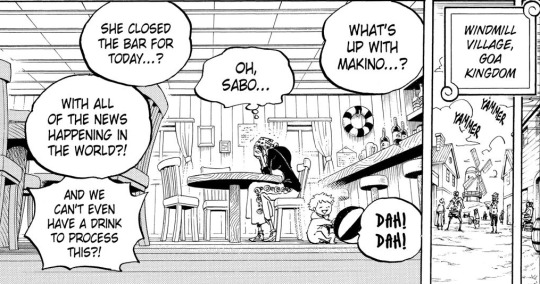
And now we know what she was looking at:
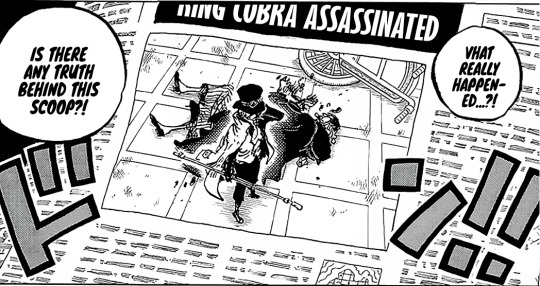
To be fair, this is a pretty damning picture (though Sabo easily could have just come across Cobra’s body when this picture was taken). And Sabo being willing to be seen in this light shows just ties into his selfless selfishness.
Moving on, we start a flashback to a month earlier in Mariejois. The Revolutionaries are attacking and causing enough chaos to bring down two admirals.
On a random note, Karasu’s Devil Fruit is just perfect for his aesthetic, and I love that for him.

It’s also very funny to me that Ryokugyu, who we saw as being incredibly bullheaded when he attacked Wano, is holding back to avoid causing damage in Mariejois...
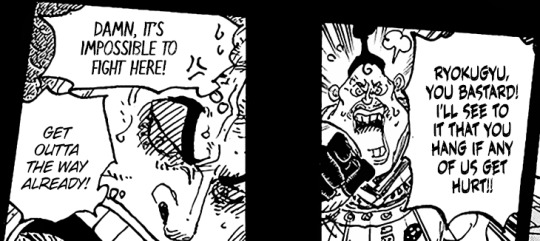
while Fujitora is pulling his best Ivan Drogo:
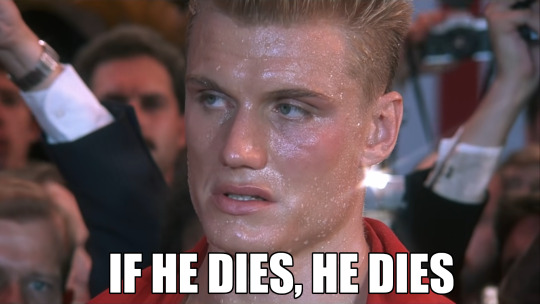

😂😂😂
I completely forgot Bonney snuck into Reverie. Whatever happened there is clearly tied into how she ends up in the water for the Straw Hats to find her.
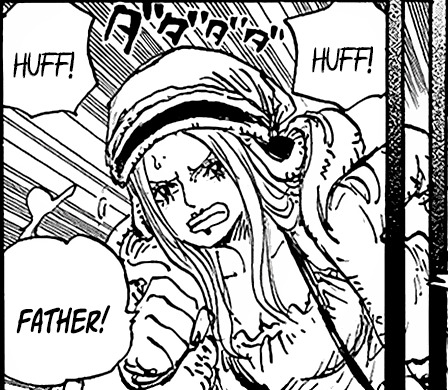
And my girl, Vivi. Fiery Vivi is the best Vivi. I love her a lot.

I’m interested in, between this flashback and Egghead, where Lucci’s character is going. It feels like he’s becoming disillusioned with the orders he’s been following; he’s a definite wild card.
It’s interesting that Cobra is going in to meet with the Elders without anyone with him--almost like he knows what’s likely to come of this meeting and doesn’t want to drag anyone into it.
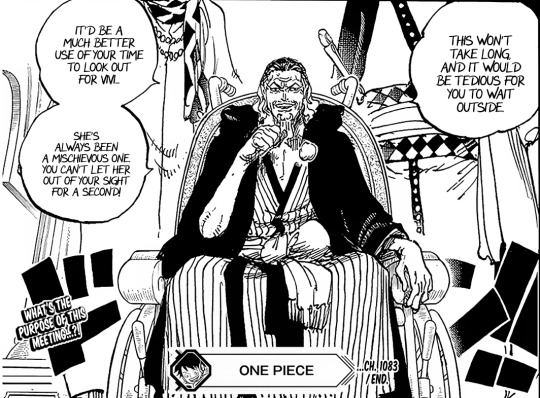
I’m looking forward to seeing how we get from this to Vivi and Wapol, of all people, hiding out with Morgans.
With all these revelations, we really are in the final saga, aren’t we?
#One Piece 1083#One Piece chapter 1083#One Piece spoilers#One Piece 1083 spoilers#Donquixote Doflamingo#Sabo#Monkey D. Dragon#Ryokugyu#Fujitora#Jewelry Bonney#Nefertari Vivi#Nefertari Cobra#Rob Lucci#One Piece#Chapter write-up
120 notes
·
View notes
Note
hey :D
first of all: love ur blog <33
second: what's your opinion on Thomas Jefferson? He's such a weird historical figure to think about because he's so conflicting. I know that we shouldn't glorify nor condemn these people, but one moment I see him as a skrunkly, but then I'm reminded of what a monster he is. I just...arghhhhh :/
Oof, if I have to be honest, Thomas Jefferson is one of the only founding fathers that I genuinely hate. I have a few that I feel conflicted with like Washington, I have ones that I dislike because of their personality or actions like Franklin but Jefferson and Monroe? Utterly despise them.
Sometimes I find goofy little anecdotes about him that I laugh at before sobering up and realising that the man I just read about was a hypocritical child rapist. I actually completely disagree with you with the 'we shouldn't condemn these people' in the case of Thomas Jefferson. As I stated in a post of mine about historical relativism, I don't believe it's entirely fair to judge someone by a standard created years after they died that they could never have known would exist in future; Slavery and marrying young were both widely accepted in the 18th century but Thomas Jefferson publicly claimed to be against slavery, he claimed it was wrong, cruel and immoral so he knew. It wasn't some standard that he was unaware of because it didn't exist in his lifetime, no, it was one of his own standards and yet, he didn't release his slaves, he continued to profit off of their suffering when he knew just how horrible what he was doing was. Also 14 is young, even for the 18th century and 14 year olds would still have been considered children, he knew Sally was far too young and he still went ahead and got her pregnant, multiple times. Washington freed his slaves in his will, Franklin freed his as an old man, Thomas Jefferson only freed 10 of his 600+ slaves, 6 of those 10 were his children.
So yeah, looking at history the way Jefferson and just general folk of the 18th century would've looked at it, Jefferson's still a pedophile and a slaveowner. Regardless of how goofy he was at times. I admit the declaration was a revolutionary document for America, literally and a lot of his bills and such have contributed a lot to America's development and creation as a country but he was still a horrible man and we should remember him as such.
#thomas jefferson#thomas jeffershit#amrev#history#and yes I am going to tag certain fandoms#that I'm a part of but#that tend to glorify this man#hamilton#1776
23 notes
·
View notes
Note
I just played Chapter 8 and your worldbuilding was absolutely insanee, it's one of my favourite chapters so far. Could we also have Senua facts and lore, she was such a fascinating character.
Ah, that's so good to hear, I was hoping reception to Chapter 8 would be positive! 🥰 Thank you so much for your kind words!
As for Senua (I love her, she's a badass), I gave more details about here in the Q&A here, which I'll copy-paste below!
Could you tell us more about Senua? She's such a great character! I couldn't help but wonder when reading about her if she is, perchance, a distance ancestor of Red? (The irony in that would be amazing! Poor Red missing out on that adventure but actually being somewhat related to Senua? lol)
Yay, I'm so glad you liked her! I wondered if her character would be more divisive given all the shit she puts MC's party through, but I personally love her! XD Unfortunately, the "real" Senua never married or had children, so she's not related to Red! I imagine that she was the only child to commoner parents who didn't really have a strong Gift themselves (I'm getting the vibe that they were cloth merchants or something like that). Around the age of six, her unusually strong magic would have started manifesting itself, so after consulting with some local teachers, her parents decided to send her to the Mage academy Stavastre. Interestingly, I think she wouldn't have completed her education there, probably running away as a teen of seventeen before earning her graduation robes because she would have been frustrated by how stifling and traditional she felt the teaching style was; Senua was a pioneer and maverick even from a young age, and coupled with her enormous Gift, she would have insisted on experimenting with magic in ways that would have made her instructors extremely uneasy or disapproving. So probably in a fit of pique after failing another class or something like that, she ran off in a "fuck the system" rebel move and probably would have traveled around for a while, doing whatever the hell she wanted. I could see her working as a blacksmith's apprentice, a sailor on a merchant barge, a keeper at a menagerie--whatever captured her fancy! She was enormously inquisitive and her mind was hungry for everything: experiences, knowledge, meeting people, new sights and sounds, what have you.
Eventually, however, she would have settled a bit more in temperament and realized that her true calling lay with magic. Returning to Stavastre wouldn't have been an option (she was also quite hardheaded and prideful), but hearing about Archmage Tangriel and the things that Saenreth was pioneering (they would have been on the absolute frontier of magic), she would have been eager to join people she perceived to be more like herself (innovative, fearless, radical, revolutionary) and would have joined the Crystal Tournament in order to secure her entrance. Notably, she wouldn't have been part of an official delegation the same way the Adepts from other schools were, which would have made them treat her a bit coolly (this gets translated into how MC and their group feel as outsiders during their Crystal Tournament); if Senua was strong enough to enter the tournament essentially on her own and without the backing of a school, the others would have considered her a threat or would have looked down on her for being so unconventional. But she would have swept the competition, and you know the rest from there!
After she left Saenreth, I'm not sure what happened to Senua. If you find Archmage Tangriel's journal at the bottom of the Cave of Many Mouths, he includes a page addressing her and voices deep regrets over sending her away. A few years after she leaves, of course, is when he enters the reclusive part of his life and ultimately withdraws from the teaching and public life entirely, living in his tower with mostly only the companionship of his spirits and a few apprentices. The doors of Saenreth ultimately closed as a school, and it was some time later that the Archmage--in his experiments to perfect a method of translocation that didn't require you to have been to your destination before--vanished entirely.
As for Senua... we know she went to Armalenthieh, and it's my guess that she became an instructor there, with all the connections and resources and recommendations and accolades Tangriel would have provided her with. But probably the scandal of their rumored affair would have caught up with her even there, and she probably wouldn't have fit in as well as she could have among the staff there anyway, preferring to be left to her own devices and teaching only because it was required of her to keep her position. Although still strong-minded, she would have become more and more solitary as time went on, until one day someone discovered that her office was empty and that Senua had simply... left. The history books don't say what happened to her after that!
34 notes
·
View notes
Text
Day 47
July 22, 2020
I am not a man… And I don’t think I ever was.
This is ridiculous and preposterous, I know, but it is not as stupid as it reads, I promise.
I was born a man because I was born with a penis. I don’t think there’s anything deeper than that. I don’t believe doctors actually examine your DNA and make sure your chromosomes match your sex—unless there are problems, of course. But, I think we can all agree, even if they did, a human being is not only whatever sexual genetic material their cells contain, aren’t they?
From then on, no one ever asked me if I wanted to be man. Of course they wouldn’t! I was too young to understand the concept, wasn’t I? So, because I was too young to process what was going on, the logical thing was just to assume I was a man. You’re born with a penis? You’re a man.
The problem, however, is that not everyone born with a penis is a man.
As far as I know, people whose gender doesn’t align with their sex—or, in the simplest words, people who have penises but aren’t men or have vaginas but aren’t women—are a minority, yes. And yet any reasonable person, I think, would agree that having that possibility alone should mean that parents, families, and society in general should be open about this and inform their children about it, right? Just to let them know that the possibility exists and that, if it is so in their case, that there are alternatives—reasonable, scientifically-proven ways—of remedying any feelings of inadequacy or general discomfort with their own bodies. After all, they’re only children. They supposedly don’t know better, but adults do. The same way we explain them every other fucking thing in the universe, from atoms to praying to an invisible bearded white man in the sky.
FUCK!
So, you grow up and, at least in my case, I never had any information about this little thing that I’ve come to know as gender dysphoria. My parents were progressive enough to talk to me about sex and relationships, but not about this. I studied in one of the most prestigious schools in the country I grew up in—and I specialized in sciences in high school, so I had the best possible education(?) on the matter—and no one ever fucking even mentioned the existence of trans people. I went to university and studied a bunch of shit, met and saw lots of people, and never in my godsdamned life had even the opportunity to learn about this. I didn’t get to have internet at home reliably until I was 24, but I was still able to teach myself a language, learn about a shit ton of things, buy books on the most diverse of topics—and in various languages—but this specific, vital knowledge was never accessible for me. And I’ve never been a slouch when it comes to research for fuck’s sake! I read (a not very good translation of) Kant’s Kritik der reinen Vernunft when I was 17 years old because I was able to borrow a copy from my school’s library. And yet, somehow, someway, I was never taught about trans people.
The closest I ever got in whole life before I was 30 were a) cross-dressers (what the people around me called "transvestites") and b) the notion of intersexual people.
How can it be possible that a decently informed human being, one who read newspapers since they were able (and could afford) to do so never learned about gender dysphoria and/or trans people?
At the top I said that human beings are not only whatever their DNA says they are. So, it follows, I think, that there must another dimension, non-biological—at least in that sense of the word—that determines them.
That is what people in the biz call “psychology”, I’m told.
So: if being born with a penis is not sufficient reason to be a man, then there must other aspects that complete this definition. Psychological, social, political, philosophical, and even ontological, perhaps? This is not something new or revolutionary and, if you don’t want this messy version of the idea that I’m putting forward, I can’t recommend you Judith Butler’s Gender Trouble: Feminism and the Subversion of Identity (1990) enough. Butler is orders of magnitude more intelligent than I am and writes way better than I ever could on the subject.
So, my poor (wo)man’s version of the issue of gender—as it pertains to me, at least—is as follows. Biologically I am man—AKA I have a penis—but, in almost all other areas of manhood (so to speak), I’m a total and absolute failure, both by my own and other people’s admission. But this isn’t really about “manhood performance”, no. My focus is, instead, on level of comfort/identification with it.
And this is the one area where my dysphoria has been most evident and I can actually trace it back the longest. I never identified as a man, in a manner. I knew that’s who I was supposed to be, on a very subconscious and obligatory level—similar to my reluctant acceptance that my family was my family, whether I liked it or not—but feeling like, happy about it? Nope. Never. Maybe a couple of times during my Conan-esque months, but at that point even I was able to discern that it was more of a pose or an attitude than really something deep and meaningful. It was something that came from the outside in, instead of the other way around.
So that’s why I say that I’m not a man and I probably never was. I was born a human male, that is the truth, but a man? Nope. I don’t think I ever felt comfortable nor identified with that gender label. What’s worse, I didn’t have the language to express my discomfort, anxiety, and sometimes erratic behavior. I was always a “dissident man”, internally, emotionally, psychologically, and affectively long before I discovered that I was also a dissident on a social and even political level.
The tragedy, of course, are the 34 years of my life that took me to realize this. To put these feelings and ideas into words. It’s my whole fucking life we’re talking about! And what’s worse, of course, is that I fear it may be too late. What chances do I have at 34? My body has already been deformed by years of mistreatment, male hormones, and general decay. What hopes and dreams can I foster? I’ve been researching and most people transition when they’re in their late adolescence, early adulthood. I’m ancient, in comparison.
Biologically, I can’t believe that my body will be malleable enough. Psychologically, I don’t think I have the strength of mind necessary to withstand the abuse most trans people undergo every day. Imagining losing my mother’s love, my father’s hard-earned approval, and my siblings’ affection terrifies me. And what about the rest of society? How would I deal with all the nazis that want trans people dead or worse? I don’t think I could. And what about my new job? I like it so much—it’s pretty much perfect, especially since I feel most of the people I get to work with like me well enough—but I don’t think a single one of those persons would accept me if I changed.
I’m not even sure if my lifelong friends or newlymet ones would, to be honest.
So, this is nice and all, but it doesn’t change a single damn thing. I’m still where I started. I’m trapped. No way out. I may now know “the truth about myself”—if there is such a thing—but it doesn’t change a fucking thing. Nice thoughts and feelings, but they’ll have to remain that. They must remain that.
Maybe one day I’ll find someone I feel confident enough to share this secret with. And maybe in sharing that secret I’ll be free, at least for that brief moment. An island of relief amidst a sea of sorrow.
Until then, with love,
ZZ
13 notes
·
View notes